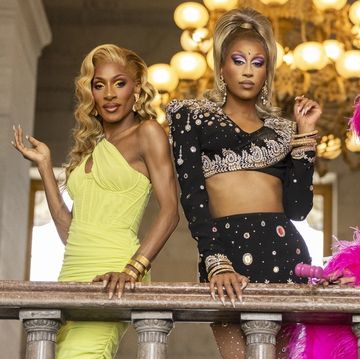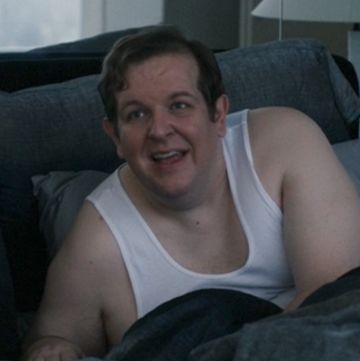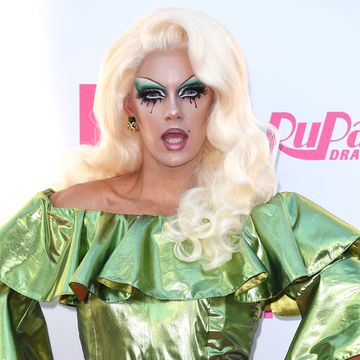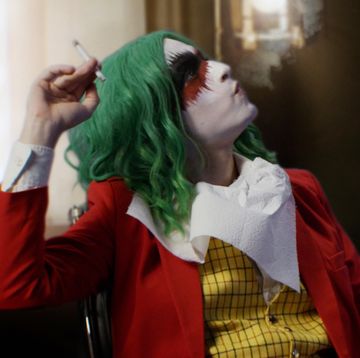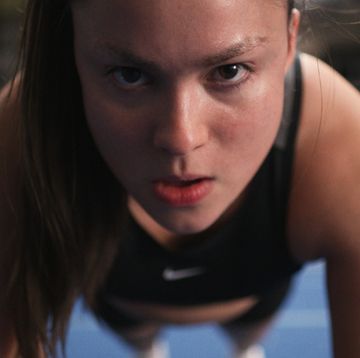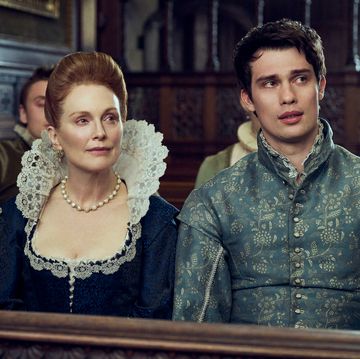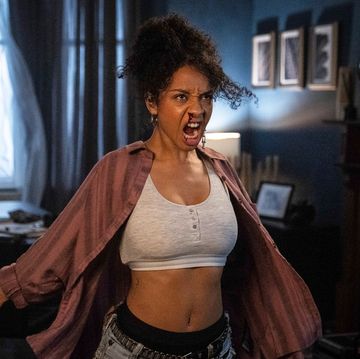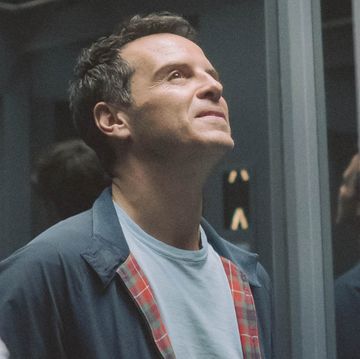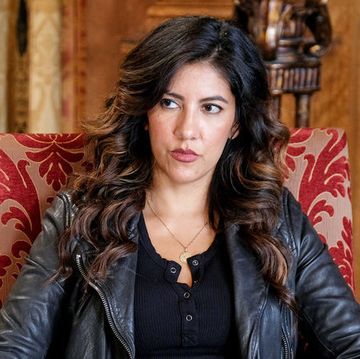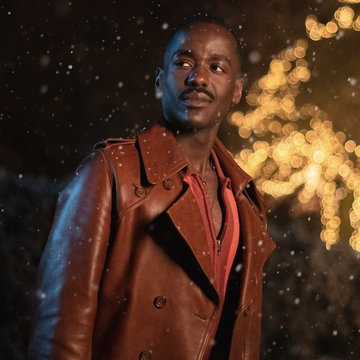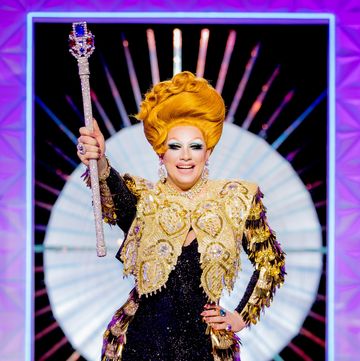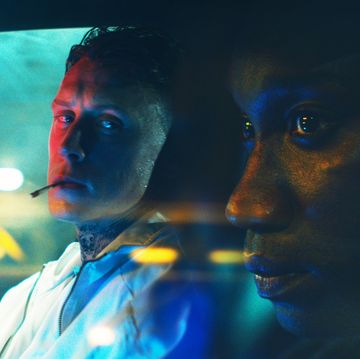Rainbow Crew is an ongoing interview series that celebrates the best LGBTQ+ representation on screen. Each instalment showcases talent working on both sides of the camera, including queer creatives and allies to the community.
Next up, we're talking to voice artist Kayleigh McKee about her role in Jujutsu Kaisen 0.
Anime has had quite the history when it comes to LGBTQ+ representation. In some ways, the queer characters depicted in most of your faves have been quite progressive, especially when compared to Western fare. But harmful stereotypes regularly pop up still, which can make things tricky for queer fans of anime.
Thankfully, this area of LGBTQ+ representation is definitely improving, and that's true not just on screen, but also behind the scenes too.
As a prominent trans voice actor who has worked across both gaming and anime, Kayleigh McKee is at the forefront of all this, actively championing more positive LGBTQ+ representation to the studios behind these shows.
"It's certainly not there yet," McKee tells us ahead of Jujutsu Kaisen 0's release in the UK. "But it is getting there. I have faith that it will continue to improve."
Digital Spy caught up with Kayleigh to discuss her role as Yuta Okkotsu and what the future might hold in store for this character beyond the prequel.
Jujutsu Kaisen 0 has enjoyed huge box office success in Japan already. Does that add pressure to the English-language release, or are you more excited than anything else?
Not so much pressure. Definitely excitement. More nervousness. I've been in one other anime movie that was in theatres, but not nearly as big a role. And this is really the full showcase of what I wanted to do as an actor with roles like this.
So it's a little bit nerve-wracking. But also, I'm happy with my performance, and I had a lot of fun. I'm very excited for people to see it, and to see all of the wonderful performances, and just how cool of a movie it is, especially to see what we did with the dub.
Do you find that your English performance is influenced by the Japanese dub?
I definitely do. So we listen to the seiyū [voice actor] when we're recording, so that we can match flaps, hear the performance, and get context. And I've always been somebody who watches both subs and dubs. I pull from my peers, I pull from other people who have done this job – not only English voice actors, but there's a lot to learn from seiyūs as well.
So I let both of those things inform my performances, and they have been instrumental to building who I am as an actor.
Did you personally relate to Yuta's story in some way?
Yeah. Actually, a lot. As a kid, I ended up moving around a lot, and I also lost a lot of friends to death. Losing those friends that way, and then losing friends to passing away, gave me a lot of experience with that kind of situation.
And I also had experience with moving high-schools, from one where I felt alone and like an outcast – I had experience being bullied – to moving to a new high-school where I made a lot more friends, where I felt more welcomed and more accepted. I really became more confident and came into myself, figuring who I was as a person.
So I was able to use a weird number of similar experiences in my life for my portrayal of Yuta.
Is there one scene in particular that really stands out to you as a key moment for Yuta?
I don't want to give away spoilers, but there is a scene where he just, for a moment… It's this time where he, for the first time, leans back, and just sort of considers. And he's not thinking about how he wants to not be alive. Or he's not thinking about how he might be in danger, or any of that.
He's just considering what's going on, and just sort of existing. And he has an experience with a friend during that moment where he has the realisation that: "There are people in this world who value me that are amazing, and I value them back. I want to learn from them, and enjoy these traits, and sort of internalise that for myself."
And I just thought that was really beautiful.
Without spoiling anything, Yuta's world becomes a lot more intense towards the end? Is it hard to switch off or decompress after using your voice in that way?
We went through it mostly chronologically, but we took the time, and I asked for the time, for when it's particularly sad, or particularly angry, or vocally stressful; to have a moment to get myself in that space; and to have a moment afterwards where we climb back out, and then go back to joking with the director. And she just made a very welcoming space for me to do that.
And it was also a thing where if I felt I couldn't give the right energy at that specific time, it was OK for me to ask, "Hey, let's go back to this. Now that we're in this space, and I feel like I can give you that energy, I want to go back, and I want to add this energy to this scene as well, to make sure that we really nail it, and that we're happy with what I'm able to pull from within myself."
How do you see Yuta's future evolving beyond the film? Could you imagine him appearing in season two or three of the main show one day?
I would certainly love it if that happened. Honestly, I know nothing of where Yuta will go from here, if anywhere, but I do know that if he comes back, I would be very excited to explore him further evolving and maturing.
My idea of what I think he would be, and become, as he matures further after learning these lessons, and potentially going through more hardships, and how he'll handle those differently, is so exciting to think about.
Being able to get that ability to portray more evolution for a character like this, who's one of my favourite characters that I've portrayed, is a very good thought. And I do hope it happens.
What are your thoughts on queer representation in anime these days? Where do you see it improving, and where do you think more work is needed still?
So, it has been improving, not just in the dub space – because people, as far as the dubs, they're being a lot more careful about writing and language. And they'll ask us. They'll reach out to some of us, and be like, "Hey, can you inform us on language that we're using for this script?"
Because a lot more anime are coming out where there are actually trans characters – the artists and the writer say that they are trans. There are things coming out where it's gay relationships, and it's overt, and it's OK in their worlds, which is different from how anime was in the past, sometimes.
So on the English side, they want to make sure that they do that well. And as far as the Japanese side as well, we've actually had communication.
I've written to some studios about trans characters, and their portrayals, and what they should consider, and what they should maybe steer away from, if they're wanting their media to be on a global scale – or even just for the trans people in Japan, which is a population that is growing, and there's activism going on right now.
So I've had those meetings. I've had those talks. And I have faith that it will continue to improve.
It's certainly not there yet. There's still some problems occasionally. But it is getting there. And I'm very happy to be part of that change. And just being in the industry, for people to see that we're here, it causes change, even without me talking to them. So I'm hopeful.
Jujutsu Kaisen 0 will be available to watch in UK cinemas from 18 March, 2022.
After teaching in England and South Korea, David turned to writing in Germany, where he covered everything from superhero movies to the Berlin Film Festival.
In 2019, David moved to London to join Digital Spy, where he could indulge his love of comics, horror and LGBTQ+ storytelling as Deputy TV Editor, and later, as Acting TV Editor.
David has spoken on numerous LGBTQ+ panels to discuss queer representation and in 2020, he created the Rainbow Crew interview series, which celebrates LGBTQ+ talent on both sides of the camera via video content and longform reads.
Beyond that, David has interviewed all your faves, including Henry Cavill, Pedro Pascal, Olivia Colman, Patrick Stewart, Ncuti Gatwa, Jamie Dornan, Regina King, and more — not to mention countless Drag Race legends.
As a freelance entertainment journalist, David has bylines across a range of publications including Empire Online, Radio Times, INTO, Highsnobiety, Den of Geek, The Digital Fix and Sight & Sound.



